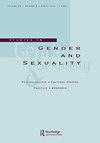Discussion of “Phantom Penis: Extrapolating Neuroscience and Employing Imagination for Trans Male Sexual Embodiment”
Q3 Social Sciences
引用次数: 0
Abstract
ABSTRACT This discussion focuses on review of writing about phantom penis and phantom limb, considering how these data and research address the question of pleasure and sexuality in trans and gender-nonbinary persons. Implications of this work on phantom penis and prosthetic penis forms for thinking of brain structure, embodiment, and fantasy as sexuality are shaped and expressed in many different kinds of persons.“幻影阴茎:神经科学的外推和对跨性别男性性化身的想象”的讨论
摘要本次讨论的重点是回顾关于幻影阴茎和幻影肢体的文章,考虑这些数据和研究如何解决跨性别和性别非二元人群的快乐和性问题。这项关于幻影阴茎和假阴茎形式的工作对思考大脑结构、化身和幻想的影响,因为性在许多不同类型的人身上被塑造和表达。
本文章由计算机程序翻译,如有差异,请以英文原文为准。
求助全文
约1分钟内获得全文
求助全文
来源期刊

Studies in Gender and Sexuality
Social Sciences-Gender Studies
CiteScore
0.80
自引率
0.00%
发文量
15
期刊介绍:
Beginning in the final two decades of the 20th century, the study of gender and sexuality has been revived from a variety of directions: the traditions of feminist scholarship, postclassical and postmodern psychoanalytic theory, developmental research, and cultural studies have all contributed to renewed fascination with those powerfully formative aspects of subjectivity that fall within the rubric of "gender" and "sexuality." Clinicians, for their part, have returned to gender and sexuality with heightened sensitivity to the role of these constructs in the treatment situation, including the richly variegated ways in which assumptions about gender and sexuality enter into our understandings of "normality" and "pathology."
 求助内容:
求助内容: 应助结果提醒方式:
应助结果提醒方式:


